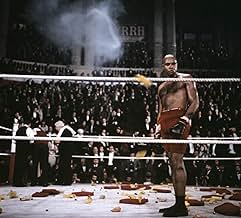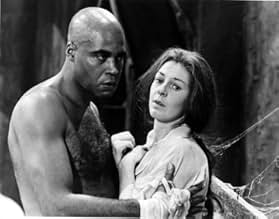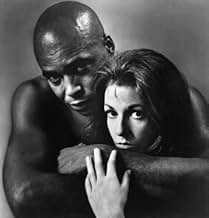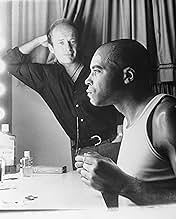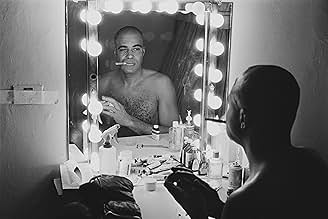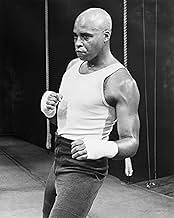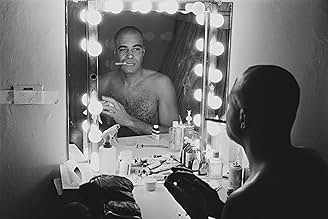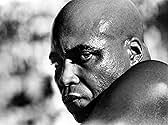Ajouter une intrigue dans votre langueA Black champion boxer and his white female companion struggle to survive while the white boxing establishment looks for ways to knock him down.A Black champion boxer and his white female companion struggle to survive while the white boxing establishment looks for ways to knock him down.A Black champion boxer and his white female companion struggle to survive while the white boxing establishment looks for ways to knock him down.
- Réalisation
- Scénario
- Casting principal
- Nommé pour 2 Oscars
- 2 victoires et 8 nominations au total
Avis à la une
Still, I regret that he hasn't left us a greater body of work on film that is worthy of his talent. Much of his best work has been performed on stage. (For instance, right now he's performing with Cicely Tyson on Broadway in a hit revival of *The Gin Game* -- go see it if you can!)
But in films? After *The Great White Hope*, you'd think Jones would have been deluged with offers for Oscar-caliber roles in Oscar-caliber films; instead, we saw him (performing admirably) in a series of mediocre films and a short-lived TV series. Like many actors, he was probably glad to be working at all -- a gig's a gig, as they say. But he deserved better. No wonder he seems to prefer the theater.
So I treasure *The Great White Hope*, not only because it's a great, great movie,but also because it is the single shining gem in the film career of a great actor -- who deserved more recognition from Hollywood than he got.
(And to be fair to this magnificent film, I must also acknowledge the other actors, all superb.)
In this and other ways, it rather betrays its theatrical origins, like the obvious act-closing scene when Jefferson (read Johnson) bays "I'll be here" at the moon and other slightly overheated scenes, especially the intimate scenes between the champ and his white girlfriend, not to mention other over-dramatised incidents particularly the "Rocky"-esque final rounds of the last fight and the Ophelia-like demise of Eleanor just before it.
The film also perhaps too obviously reflects its own times as it too blatantly looks to reach out from the screen to chime in with the Civil Rights arguments of the then present-day rather than of Johnson's own time. I might also argue against the downbeat ending as presented here and personally think the film could have easily just concentrated on his historic fight with the Brady (read Jim Jeffries) character as a more upbeat finish even as I appreciate that this would have omitted the tragedy of what followed as the FBI, press and the white-controlled boxing hierarchy all combined to strip Jack of his hard-won title. Here, you see almost nothing of the fight action in Reno between the two combatants, far less Johnson's final knock-out of the returning ex-champ, himself out to recapture the title belt for the white race.
It wouldn't be the first time of course that either Broadway or especially Hollywood would rewrite history for its own ends and maybe I'm being somewhat revisionist myself in my feelings today about the film. It still manages to pack a punch in many ways especially Jack's clever escape from the police with the help of the local black baseball team or the staging of the last fight, with the crowd scene around the ring vividly resembling the actual footage of it in Cuba back in the day.
What's not in doubt either are the excellent lead performances from James Earl Jones and Jane Alexander or the recreation of the era by director Ritt.
This really is a movie, good as it is, that I think could benefit from a modern-day adaptation less devoted to the original play and in so doing give Johnson back his real name and slightly less histrionically tell his remarkable story to a new generation.
That, at least, is the great (white) hope of mine I take way from this still worthy movie.
******* The Great White Hope (10/11/70) Martin Ritt ~ James Earl Jones, Jane Alexander, Chester Morris, Hal Holbrook
Le saviez-vous
- AnecdotesRedd Foxx, who knew former heavyweight champ Jack Johnson, whose career and struggle against racism inspired the original play, turned down a role in the film as he believed it was not a true picture of his old friend.
- GaffesIn the first scene in which we see Jefferson practicing, the sweat on his shirt changes from shot to shot in a way that wouldn't be predicted by evaporation.
- Citations
Reporter: Now you're the first Black man in the history of the ring who's ever had a crack at the heavyweight title. Now white folks, of course, are behind Brady. He's the redeemer of the race and so on. But you, Jack Jefferson, are you the Black hope?
Jack Jefferson: Well, I'm Black and I'm hopin'.
Goldie: Answer him straight, Jack.
Jack Jefferson: Hey, look, man, I ain't fighting for no race, I ain't redeeming nobody. My mama told me *Mr. Lincoln* done that. Ain't that why you shot him?
- Crédits fousThe 20th Century Fox logo appears without the fanfare.
- ConnexionsEdited into The Loving Story (2011)
- Bandes originalesLet Me Hold You In My Arms Tonight
Written and Performed by Jesse Fuller
Meilleurs choix
- How long is The Great White Hope?Alimenté par Alexa
Détails
Box-office
- Budget
- 8 000 000 $US (estimé)
- Durée1 heure 43 minutes
- Couleur
- Rapport de forme
- 2.39 : 1


